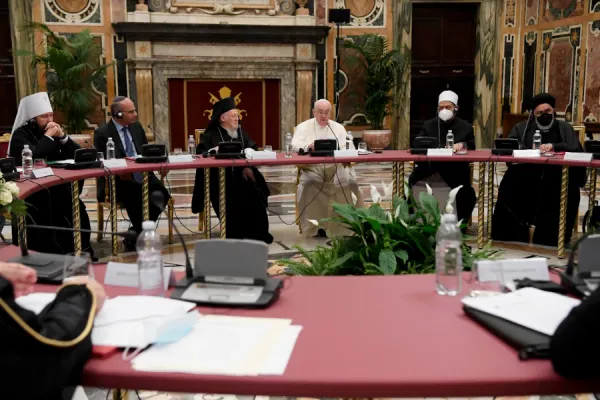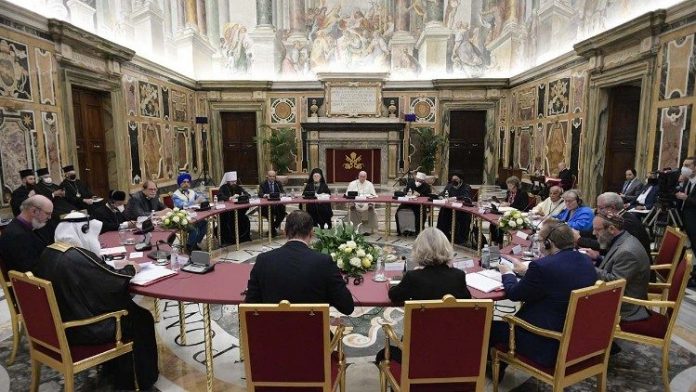H Α.Θ. Παναγιότης ο Οικουμενικός Πατριάρχης Βαρθολομαίος μαζί με την Α. Αγιότητα τον Πάπα Φραγκίσκο συμμετείχαν, σήμερα, Τρίτη, 5 Οκτωβρίου 2021, στη συνεδρίαση στρογγυλής τράπεζας στην Αίθουσα Clementine του Βατικανού, με θέμα τον ρόλο της Θρησκείας στην Παιδεία, με αφορμή τον εορτασμό της σημερινής Παγκόσμιας Ημέρας Εκπαιδευτικών.
Ο Πατριάρχης και ο Πάπας απηύθυναν χαιρετισμό όπως και οι εκπρόσωποι όλων των Εκκλησιών και Θρησκευτικών Κοινοτήτων που είχαν προσκληθεί, μαζί με την αρμόδια εκπρόσωπο της UNESCO.
Το βράδυ ο Παναγιώτατος παρακάθισε στο δείπνο που παρέθεσε προς τιμήν του ο Εξοχ. κ. Lütfullah Göktaş, Πρέσβης της Τουρκικής Δημοκρατίας στο Βατικανό.
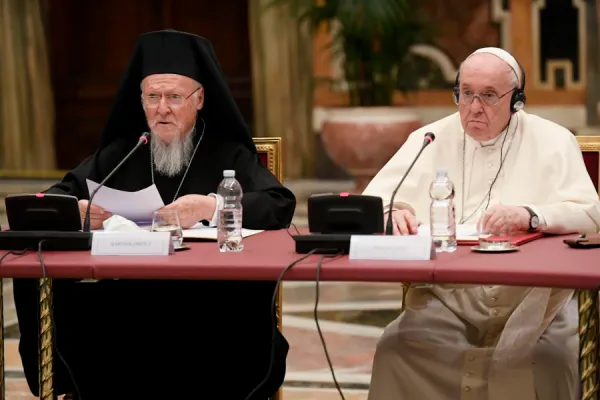
Προσφώνησις
τῆς Α. Θ. Παναγιότητος
τοῦ Οἰκουμενικοῦ Πατριάρχου
κ. κ. Βαρθολομαίου
κατά τήν ἐκδήλωσιν
«Religions and Education:
Towards a Global Compact on Education»
(Βατικανόν, 5 Ὀκτωβρίου 2021)
* * *
Ἁγιώτατε,
Τιμιώτατοι ἐκπρόσωποι τῶν θρησκειῶν,
Ἐκλεκτή Ὁμήγυρις,
Ἡ ἐκπαίδευσις τῆς νέας γενεᾶς ἀνήκει εἰς τά δυσκολώτερα προβλήματα, τά ὁποῖα καλοῦνται νά λύσουν αἱ κοινωνίαι. Εἰς τήν ἐποχήν μας, εἰς τό οὐσιαστικῶς πολύπλοκον ἔργον τῆς παιδείας προστίθενται καί νέαι δυσχέρειαι, αἱ ὁποῖαι συνδέονται μέ τά σημεῖα τῶν καιρῶν. Ἡ ἁλματώδης ἀνάπτυξις τῆς ἐπιστήμης καί τῆς τεχνολογίας, ἡ ἔκρηξις τῶν πληροφοριῶν καί τό διαδίκτυον, τό φαινόμενον τῆς παγκοσμιοποιήσεως καί ἡ παντοκρατορία τῶν οἰκονομικῶν κριτηρίων, ἡ ἐκκοσμίκευσις, αἱ κοινωνικοπολιτικαί ἐξελίξεις, ἡ πολυπολιτισμικότης καί ὁ πλουραλισμός, ὁ ἀγών διά τάς πολιτισμικάς ταυτότητας, ὁ θρησκευτικός φονταμενταλισμός κ. ἄ., δημιουργοῦν ἰσχυρούς κλυδωνισμούς εἰς τόν θεμελιώδη διά τήν κοινωνίαν καί τόν πολιτισμόν αὐτόν χῶρον. Πολύτιμοι παραδόσεις κλονίζονται, ἡ ἐλευθερία τοῦ ἀνθρώπου παρανοεῖται ὡς «τέχνη ἀποφυγῆς τῶν δεσμεύσεων», διαδίδεται παγκοσμίως ὁ ἀτομοκεντρισμός καί ὁ δικαιωματισμός. Τοιουτοτρόπως, καθίσταται λίαν δυσχερής ἡ διατήρησις τοῦ ἀνθρωπιστικοῦ προσανατολισμοῦ τῆς παιδείας καί τοῦ παιδαγωγικοῦ χαρακτῆρος τοῦ σχολείου.
Ἐκ τῆς ἑλληνικῆς ἀρχαιότητος προέρχεται ἡ θεώρησις τῆς παιδείας ὡς «περιαγωγῆς τῆς ψυχῆς» πρός τό ἀγαθόν (Πλάτωνος, Πολιτεία, 518 d). Ἡ ἑλληνική σοφία ἀπεφάνθη ἐπίσης, ὅτι ἡ ἀληθής παιδεία δέν μᾶς προετοιμάζει ἁπλῶς διά νά ἐπιτυγχάνωμεν ὅ,τι ἐπιθυμοῦμεν, ἀλλά διά νά ἐπιθυμῶμεν τό «δέον», αὐτό τό ὁποῖον ὑπηρετεῖ τήν ἀρετήν καί τήν ἀλήθειαν. Ὄντως, ἡ παιδεία ἀναφέρεται εἰς αὐτό πού ὀφείλει νά εἶναι ὁ ἄνθρωπος καί ὄχι εἰς ὅ,τι εἶναι.
Σήμερον ἀποκαλύπτεται ἐκ νέου ἡ ζωτική σημασία τῆς λειτουργίας τῆς ἀγωγῆς ὡς «παιδείας ἀξιῶν», ἡ ὁποία στρέφει τόν ἄνθρωπον πρός τά οὐσιώδη τοῦ βίου. Ἐπειδή δέ ἡ μετάδοσις τῶν ἀξιῶν διέρχεται διά τῆς ὀρθῆς σχέσεως διδασκάλου καί μαθητοῦ, τονίζεται ἐκ νέου ὁ παιδαγωγικός ρόλος τοῦ διδασκάλου καί ἡ σπουδαιότης τῆς μαθητείας.
Ὁ γνήσιος διδάσκαλος καί ὁ μαθητής ἀποτελοῦν πολυτίμους κατακτήσεις, αἱ ὁποῖαι δέν ἀπεμπολοῦνται, ἀλλά φυλάσσονται ὡς κόρη ὀφθαλμοῦ. Ὁ διδάσκαλος, ὁ ὁποῖος διαχειρίζεται τήν παιδικήν καί τήν ἐφηβικήν ἡλικίαν, κατά τήν ὁποίαν τίθενται αἱ βάσεις διά τόν ἀξιολογικόν προσανατολισμόν καί τήν διαμόρφωσιν τοῦ χαρακτῆρος τοῦ ἀνθρώπου, δέν εἶναι εἷς ἀνώνυμος παράγων τῆς ἐκπαιδεύσεως, ὁ ὁποῖος μεταδίδει χρηστικάς γνώσεις, ἀλλά ὁ παιδαγωγός πού βοηθεῖ τόν μαθητήν νά ἀποκτήσῃ αἰσθητήριον διά τό βάθος τῶν πραγμάτων, νά ἱεραρχήσῃ τάς ἐπιθυμίας καί τούς στόχους του, νά κατανοήσῃ τήν ἀξίαν τῆς κοινωνικῆς εὐθύνης. Ἀπευθύνεται πάντοτε εἰς τήν ἐλευθερίαν τοῦ νέου ἀνθρώπου καί ἀποβλέπει εἰς τήν στήριξίν του εἰς τόν ἀγῶνα διά τήν ὀρθήν χρῆσιν της. Δέν ἐπιβάλλει, ἀλλά προτρέπει, προσκαλεῖ, συμπορεύεται, ἐν ἐπιγνώσει ὅτι ἡ ἐλευθερία καί ἡ ὑπευθυνότης θέλουν χρόνον καί προσπάθειαν διά νά ριζώσουν καί νά ἀναπτυχθοῦν. Ὁ διδάσκαλος διδάσκει μέ αὐτό πού εἶναι, μέ τήν προσωπικότητα, μέ τήν ἀκτινοβολίαν τῆς ψυχῆς του, μέ τό παράδειγμά του, μέ τήν ἀπροϋπόθετον ταύτισίν του μέ τήν «ἁγίαν ἀποστολήν» του.
Μέ ὅλα αὐτά μετατρέπει τά παιδιά εἰς πραγματικούς «μαθητάς», οἱ ὁποῖοι ἀναγνωρίζουν τόν μόχθον καί τό ἐνδιαφέρον τοῦ διδασκάλου δι᾿ αὐτούς, καί ἡ ἰδέα τῆς «μαθητείας» ἐγγράφεται εἰς τήν συνείδησίν των ὡς τιμαλφεστάτη παρακαταθήκη δι᾿ ὁλόκληρον τήν ζωήν των. Εἶναι βέβαιον, ὅτι ὁ ἐκπαιδευτικός χωρίς αὐτό τό «ἦθος τοῦ δασκάλου» δέν δύναται νά ἀσκήσῃ ἀποτελεσματικῶς τό ἔργον παιδείας. «Μόνον ἡ ἰδέα πού ῾γίνεται σάρκα᾿ μπορεῖ νά ἐπιδράσει στόν ἄνθρωπο. Ἡ ἰδέα πού παραμένει λόγος, μπορεῖ νά ἀλλάξει μόνον λόγια». Ὄντως, ὁ αὐθεντικός διδάσκαλος ἀποτελεῖ καί σήμερον τό μέγιστον κεφάλαιον τῆς παιδείας.
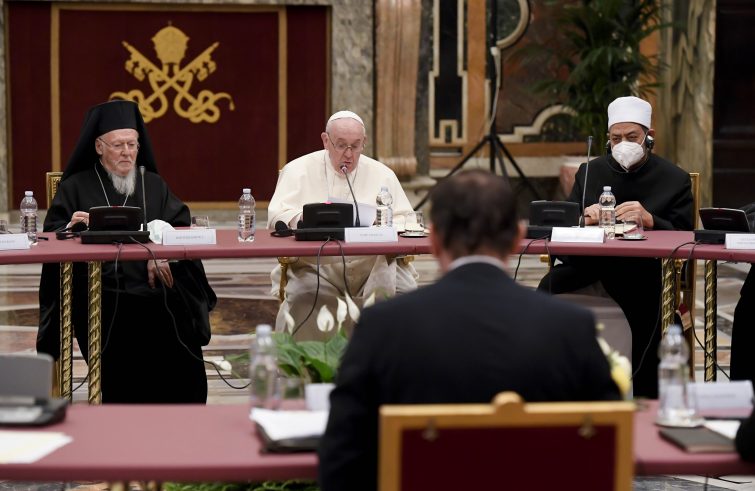
Εἶναι αὐτονόητον, ὅτι μόνον γνήσιοι διδάσκαλοι δύνανται νά συμβάλουν εἰς τήν θετικήν ἀντιπετώπισιν τῶν συγχρόνων μεγάλων προκλήσεων εἰς τόν χῶρον τῆς παιδείας. Αὐτοί θά διαδραματίσουν σημαντικόν ρόλον εἰς τήν ὑπέρβασιν τῶν δυσκολιῶν εἰς τήν ἐκπαίδευσιν, τάς ὁποίας ἔχει προκαλέσει καί συνεχίζει νά δημιουργῇ ἡ πανδημία τοῦ κορωνοϊοῦ Covid – 19. Αὐτοί θά ἀναδεικνύουν τήν σημασίαν τῆς σχολικῆς θρησκευτικῆς ἀγωγῆς διά τήν πνευματικήν καί κοινωνικήν ἀνάπτυξιν τῶν νέων, καί θά διδάξουν εἰς τήν νέαν γενεάν τήν λειτουργίαν τοῦ διαλόγου, τό πνεῦμα τῆς διαπολιτισμικότητος καί τήν ἀξίαν τῆς εἰρηνικῆς συμβιώσεως μέ τόν ἄλλον, τόν διαφορετικόν.
Ἐπιθυμοῦμεν νά ἐξάρωμεν τήν συμβολήν τῆς θρησκευτικῆς ἀγωγῆς εἰς τό ζήτημα τῆς συνυπάρξεως τῶν διαφορετικῶν εἰς τάς συγχρόνους πολυπολιτισμικάς κοινωνίας. Ἐν τῷ πλαισίῳ της, τά παιδιά καί οἱ νέοι θά κατανοοῦν ὅτι τό ἐνδιαφέρον διά τήν ἀνάπτυξιν τῆς ἰδικῆς των θρησκευτικῆς ταυτότητος ὄχι μόνον δέν συνιστᾷ ἐμπόδιον διά τήν ἐπικοινωνίαν μέ τόν διαφορετικόν, ἀλλά ὅτι ἀποτελεῖ βάσιν καί προϋπόθεσιν διά τήν ἀνοικτοσύνην πρός τόν ἄλλον. Μόνον ὅσοι ἔχουν ταυτότητα καί τήν ἐκτιμοῦν, δύνανται νά ἐπιδείξουν γνήσιον ἐνδιαφέρον καί διά τήν ταυτότητα τοῦ ἄλλου, δι᾿ ἐπικοινωνίαν καί συνεργασίαν μετ᾿ αὐτοῦ.
Ἡ παρουσία καί ἡ ὀρθή ὀργάνωσις τῆς θρησκευτικῆς ἀγωγῆς εἰς τόν χῶρον τῆς ἐκπαιδεύσεως εἶναι ζωτικῆς σημασίας διά τό μέλλον τῆς ἀνθρωπότητος. Οἱ νέοι πρέπει νά διδάσκωνται τήν θρησκείαν, ἡ ὁποία τονίζει τήν πνευματικήν ταυτότητα καί τόν αἰώνιον προορισμόν τοῦ ἀνθρώπου, δίδει ἀπαντήσεις εἰς τά μεγάλα ὑπαρξιακά ἐρωτήματα καί εἰς τήν ἀναζήτησιν νοήματος ζωῆς, καθορίζει τήν ἰδιοπροσωπίαν λαῶν καί πολιτισμῶν, ἔχει διασώσει πολυτιμοτάτας πνευματικάς παραδόσεις, τόν σεβασμόν πρός τήν δημιουργίαν, ἀντιστέκεται εἰς τάς τάσεις, αἱ ὁποῖαι ὁδηγοῦν εἰς τήν φαλκίδευσιν τῆς ἱερότητος τοῦ ἀνθρωπίνου προσώπου, καί δύναται νά συμβάλῃ καθωριστικῶς εἰς τήν εἰρήνην καί τήν καταλλαγήν, εἰς τήν ἀνάπτυξιν ἑνός πολιτισμοῦ ἀλληλεγγύης καί ἀδελφοσύνης.
Ἐν ὄψει τοῦ γεγονότος ὅτι ἡ θρησκεία χρησιμοποιεῖται σήμερον συχνάκις ἀπό φονταμενταλιστικούς κύκλους ὡς ὄχημα διασπάσεων καί συγκρούσεων, ἡ ὀρθή θρησκευτική ἀγωγή, ὡς παιδεία εἰρήνης, ἀποκτᾷ ἰδιαιτέραν ἐπικαιρότητα. Προετοιμάζει τά παιδιά καί τούς νέους διά νά συμμετάσχουν εἰς τήν οἰκοδομήν ἑνός κόσμου εἰρήνης, ὅπου ὁ ἄνθρωπος θά βλέπῃ εἰς τό πρόσωπον τοῦ συνανθρώπου του τόν ἀδελφόν καί ὄχι τόν ἐπίβουλον ἤ ἀκόμη καί τόν ἐχθρόν.
Ἁγιώτατε,
Ἐκλεκτοί παρόντες,
Ἡ ποιότης τῶν ὁραμάτων μιᾶς κοινωνίας κρίνεται ἀπό τό πῶς αὐτή ἀξιολογεῖ καί ὀργανώνει τήν ἐκπαίδευσιν τῆς νέας γενεᾶς, ἀπό τό πῶς βλέπει τό σχολεῖον καί τούς σκοπούς τῆς παιδείας, τόν ρόλον τοῦ διδασκάλου καί τοῦ μαθητοῦ. Συγχαίρομεν τούς διοργανωτάς τῆς παρούσης συναντήσεως, ἀφιερωμένης εἰς τό ἀνεξάντλητον θέμα τῆς παιδείας ἐν ἀναφορᾷ πρός τήν θρησκείαν, καί εὐχαριστοῦμεν διά τήν εὐκαιρίαν νά ἀπευθύνωμεν τήν παροῦσαν προσφώνησιν πρός πάντας ὑμᾶς.
Εὐχαριστοῦμεν διά τήν προσοχήν σας!

(a cura Redazione “Il sismografo”)
Your Holiness,
Most honorable religious representatives,
Distinguished participants,
Educating the younger generation is one of the most difficult challenges that societies are called to resolve. In our age, the essentially complex task of education is compounded by new difficulties associated with the signs of the times. The explosive development of science and technology, the eruption of information and the internet, globalization and the omnipotence of economic criteria, secularization, socio-political changes, multiculturalism and pluralism, the struggle for cultural identity, religious fundamentalism and so much more, create powerful shackles for this otherwise basic dimension of society and civilization. Precious traditions are shattered, human freedom is misinterpreted as “the art of avoiding limitations,” individualism and the libertarian conception of the human rights regime are spreading everywhere. Thus, preserving the humanistic orientation of education and the pedagogical character of schools are rendered increasingly difficult.The Greek classics perceive the vision of education as “the convergence of the soul” towards good (Plato, Republic 518d). Greek wisdom also determines that true education does not merely prepare us to achieve whatever we desire, but to desire that which we should – namely, that which serves virtue and truth. Indeed, education is related to what humankind ought to be rather than to what it is.
Today we are once again discovering the vital importance of education as transmission of values, which directs human beings to what is essential in life. Inasmuch as this process passes through the channel of the proper relationship between teacher and pupil, the pedagogical role of the teacher and the critical responsibility of discipleship are emphasized anew.
The genuine teacher and pupil comprise invaluable elements, which cannot be dismissed, but must be preserved as irreplaceable. A teacher that deals with the ages of childhood and adolescence – when the foundations for the orientation of values and development of character are established – is not some anonymous factor of education that conveys useful knowledge, but a pedagogue that assists the pupil to acquire a perception of the depth of reality, to prioritize his desires and ambitions, and to comprehend the value of social responsibility. Such a pedagogue always addresses the freedom of his pupils and aims at supporting their struggle to use this freedom properly. A pedagogue does not impose but exhorts; he invites and accompanies, knowing full well that freedom and responsibility require time and effort in order to take root and be cultivated. A pedagogue teaches by means of who and what he or she is – with their personality, with the radiance of their soul, with their example, and with their unconditional identification with their “sacred mission.”
Accordingly, a pedagogue shapes genuine “pupils” that recognize the endeavor and interest of their teacher so that the ideal of discipleship is registered in their conscience as a cherished legacy for their whole life. It is certain that any pedagogue that lacks this “ethos” cannot successfully implement the objective of education. “Only an idea that ‘assumes flesh’ can influence someone. An idea that remains word can only change words.” Indeed, an authentic teacher constitutes the essential cornerstone of education.
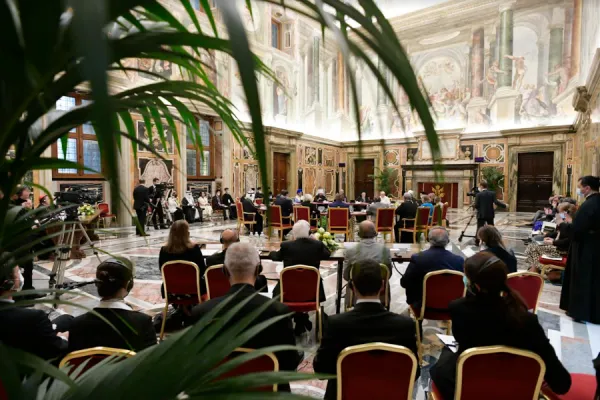
Naturally only authentic teachers can contribute to a positive confrontation of the great contemporary problems in the field of education. They will, for example, play an important role in overcoming educational problems created and continued by the coronavirus pandemic. They will raise awareness about the importance of religious education in schools for the spiritual and social upbringing of young people. And they will teach the younger generation about the function of dialogue, the spirit of inter-cultural exchange, and the value of peaceful coexistence with the other, the different.
We would like to highlight the contribution of religious education in the matter of coexistence among different cultures in contemporary societies. In this context, children and young men or women will understand that the interest in developing their personal religious identity does not comprise an impediment for communicating with others, while also constituting the basis and prerequisite for openness toward others. Only those who have and appreciate a particular identity are able to demonstrate genuine interest for the identity of others as well, and are thereby capable of communicating and collaborating with others.
The presence and proper organization of religious identity in the field of education is of crucial importance for the future of humankind. Young people must be taught about a religion:
• which stresses the spiritual identity and eternal destiny of all;
• which offers answers to the great existential questions and quest for meaning in life;
• which determines the identity of peoples and cultures; which has preserved inestimable spiritual traditions, as well as respect for creation;
• which resists trends leading to the diminishment of the sacredness of the human person;
• and which can contribute decisively to peace and reconciliation, as well as to the cultivation of a civilization of solidarity and fraternity.
In light of the fact that religion is today frequently used by fundamentalist circles as a vehicle of division and conflict, proper religious education – as an education of peace – acquires special timeliness. It prepares children and young men or women to participate in the creation of a world of peace, where human beings can see in the face of their fellow human beings a brother and sister, rather than a threat or – worse – an enemy.
Your Holiness,
Distinguished friends,
The quality of the vision of a society is judged by how it evaluates and organizes the education of the younger generation, as well as by how it perceives school and the aims of education, including the role of the teacher and pupil. We congratulate the organizers of this assembly that is devoted to the inexhaustible issue of education in relation to religion. And we are grateful for the opportunity to address you.
Thank you very much for your kind attention!
